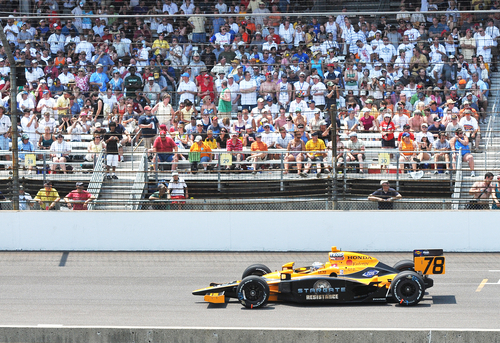“Would you like tickets?” a stranger asked my husband. She extended a hand showing passes that would allow us to sit on bleachers instead of standing four deep on the sidewalk to watch a parade.
My husband looked at the woman dubiously. “How much?” he asked.
It was the day before the Indianapolis 500, and downtown was frenzied – jugglers on stilts, vendors selling popcorn, clowns on motorcycles, tiny dogs in designer purses. A man waved a Bible in one hand and a full-size American flag in the other, and I could smell cinnamony churros from a vendor.
We had traveled to Indiana for the 100th anniversary of the race, an event my husband never misses on TV. Gary had dreamed of taking our daughter to that race, but I wasn’t sure I’d be well enough to go.
Was this woman pulling a scam? Why was she offering tickets?
“No charge,” the lady said. “You can have my extras.”
She didn’t look like a scammer. Kindness radiated from her face, and she was accompanied by what looked like grandchildren and a friend.
Our day had started early, and my feet were swollen from walking. Gary and Lauren were still going strong, but I was fatigued. Those bleachers looked like a dream come true, and I was anticipating the moment when I could rest, even briefly. “My wife is recovering from breast cancer, and she’s tired,” my husband said. “If you’re sure you don’t mind, we’d love your tickets.”
Generally I hate telling people that I’m in cancer recovery, but my husband talks about it with ease. When he does, I silently remember that it’s his disease, too; that he endured a year of care-taking, running our family business, and rearing our child pretty much on his own, all under an umbrella of worry.
He took the tickets and I sank onto that hard seat as if it were a lazy boy lounger. Although mostly I feel healthy and strong, at times exhaustion overcomes me, especially if I’ve done too much or experience sensory overload. That bleacher was a gift.
We sat together, the stranger, her family and us, waiting for the parade to start, taking in the mayhem.
“My daughter was just diagnosed,” the lady said. I heard panic in her voice. “We just found out two days ago.”
I looked at the two boys with her and knew how terrified that family must be. Cancer is open ended — a path of brutal treatments, baldness, amputations, and uncertainties. Nobody wants it.
I remember the early days of my own situation, the onslaught of terminology I’d never heard, so many questions, incomprehensible and yet urgent. How do you get up to speed in a matter of days? How do you make informed decisions when you don’t even know what to ask?
And for me, insurance issues complicated everything. My diagnosis coincided with the onset of Obamacare, a policy that rendered our family’s health coverage invalid. It was nuts.
“Take my card,” I said, “Your daughter can contact me. I’ll share information, and we’ll all pray for her.
“Her name is Dawn,” the lady said. She pronounced it clearly so there’d be no mistake, so I’d get it right when I prayed.
“Dawn,” I repeated. “Got it.”
Every cancer patient I know, spiritual or not, has always appreciated prayers. I guess it’s true that there’s no such thing as an atheist in a foxhole.
A week later, when we were home, I received an email from Dawn. Then a phone call. We exchanged photos and stories, and now, we’re friends.
Dawn has two sons; I have one daughter. She lives in Indiana; I live in California. She’s black; I’m white. And we’ve never actually met.
A chance meeting with her mother brought us together, but cancer has created the bond. We’re united by a thin but powerful thread, a common experience, and I feel vested in her recovery. Rooting for her is rooting for myself and for all the others whose survival feels tenuous. We have babies to raise, husbands to love, families to nurture, work to do. We want each other to flourish.
Ironically, cancer is the vehicle that delivered this lesson home.
photo credit: carroteater / Shutterstock.com
Note: Breast Cancer News is strictly a news and information website about the disease. It does not provide medical advice, diagnosis, or treatment. This content is not intended to be a substitute for professional medical advice, diagnosis, or treatment. Always seek the advice of your physician or other qualified health provider with any questions you may have regarding a medical condition. Never disregard professional medical advice or delay in seeking it because of something you have read on this website. The opinions expressed in this blog article are not those of Breast Cancer News, or its parent company, BioNews Services, and are intended to spark discussion about issues pertaining to the disease.

